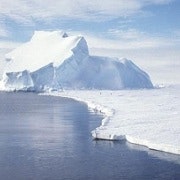The hot air of climate sceptics
I got an email the other day from an occasional visitor to the Climate Central website, asking whether we'd be covering a series of recent challenges to conventional climate science. He was being facetious: he knew we probably wouldn't, and he was right – clear evidence, he proclaimed triumphantly, that our claim of following the science wherever it leads is just a lot of empty talk.
My first reaction was: ‘how dare you suggest such a thing!' But that's a throwaway line, not a response, and I thought I should provide a fuller answer. The bottom line is that we ignore people who claim to have found holes in the mainstream ideas of climate change if their claims don't make lot of sense. Who gets to decide? Well, we do. But it's not arbitrary: there's a thought process behind it, and it's a pretty valid one, though it's not infallible.
Here's what I mean by “not infallible.” More than once in the history of science, a new insight by someone outside the intellectual mainstream has been dismissed – often rudely – by the establishment. Take Galileo, whose insistence that the Earth goes around the Sun got him in terrible trouble with the Catholic Church, whose leaders just knew it didn't. Or take Alfred Wegener, who claimed in the early 1900s that continents move about the Earth. ‘Crazy!' said professional geologists. But he was right, too. Or how about Ignaz Semmelweis, the Hungarian doctor who argued in the mid-1800s that doctors should wash their hands between seeing patients to prevent the spread of infection. He was vilified for this crazy idea by his fellow physicians – but guess what? You got it.
So when people like Princeton physicist Will Happer lays out his critique of climate science in the Wall Street Journal, or the eminent British scientist James Lovelock, author of the Gaia theory, says to MSNBC that he was “alarmist” about climate change, or when a group of NASA astronauts and engineers writes an open letter to NASA accusing it of relying on climate models rather than real evidence in making climate projections, it would be foolish just to assume they're wrong because a majority of professional climatologists disagrees with them — even though the odds suggest they are.
But sometimes outsiders say things that truly make no sense, that's another story. Back in the 1950s, a psychotherapist named Immanuel Velikovsky published his theory that Old Testament stories of the Sun standing still for a day, the Red Sea parting, and the Israelites surviving on manna from heaven, were all true. They were all caused by the planet Venus – in fact, he said, not a planet at all, but a gigantic comet burped out by Jupiter – flying back and forth past the Earth several times. “The less one knows about science,” one critic wrote, “the more plausible Velikovsky's scenario appears... “
That turns out to be true about the challenges I was challenged to write about. Take statements by Professors Lovelock and Happer about the fact that warming has been fairly flat for the past decade or so, which it has. This, they both suggest, refutes the claims of mainstream climatologists that the temperature should have continued to rise.
The thing is, nobody made such claims in the first place. Climate scientists have always acknowledged that natural variations would slow the warming during some periods and speed it up in others. Suggesting otherwise is simply incorrect – and people trumpeting the ‘failure' of a prediction nobody ever made isn't news in my book.
Or take Happer's claim that “CO2 is not a pollutant” because plants need it to live. The second part is true enough, but that doesn't make the whole thing true. Humans need water to live, but you can get sick or even die if you drink too much. Plants grow better with more CO2, on average (poison ivy does especially well), but unless water and other nutrients also increase, the effect runs out of steam after a while.
Then you've got the astronauts. Their big beef is that climate scientists rely solely on computer models to project future climate, but that you need real-world observations to keep your models honest; otherwise, they're just glorified X-box games. It seems like a pretty good point.
But once again, the basic premise is simply false. Climate scientists use all sorts of information in constructing projections for the future. They look deep into the past, for example, to see how the planet's climate has changed over millions of years, and what forces made that happen. They look at temperature and CO2 records gathered by modern instruments in the past half-century or so. And they test their computer models by setting them in the virtual past and seeing if their ‘predictions' of 20th-century temperature are anywhere close to what actually ended up happening.
Guess what? They match up pretty well.
And that's why I most often don't report on these challenges. When someone publishes a scientific paper in a peer-reviewed journal that takes on one or more of the central tenets of climate science, that's a different story, and one worth covering. When someone simply says something that is demonstrably false – and especially when it's been said repeatedly and refuted every time – I tend to stay away.
Except for this time, of course.
This article was originally published on Climate Central. Republished with permission.













